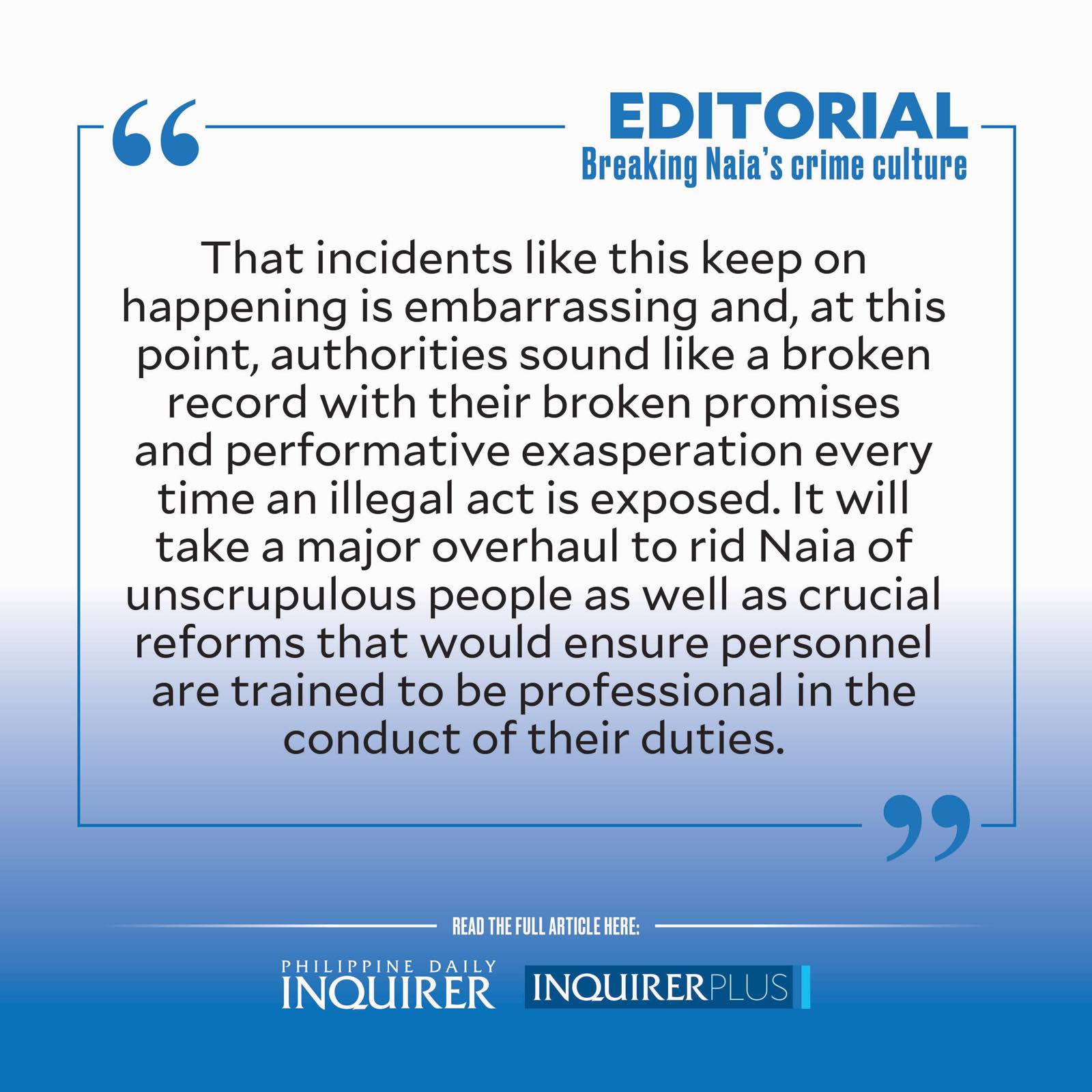
Just how deeply rooted is the culture of crime at the Ninoy Aquino International Airport (Naia)?
As if past incidents were not embarrassing enough, an airport screener is now accused of filching $300 from a departing passenger’s bag and then doing the unthinkable—swallowing the paper bills in $100 denominations.
A Chinese national complained that his wallet had been tampered with after passing through the baggage inspection at Terminal 1 of Naia, a notorious crime hotspot that gained its ignominy as one of the world’s worst airports. According to an official report released by airport authorities, closed-circuit television (CCTV) footage showed a female security screener working for the Office for Transportation Security (OTS) “deliberately swallowing the dollar bills, folded into one small piece.”
The Manila International Airport Authority said the OTS personnel was seen “almost choking in her effort to swallow the dollar bills’’ to ensure that there would be no evidence of the theft, with one colleague even handing her a bottle of water to help her swallow the money. The authorities did not say if the personnel actually swallowed the money but she has denied the accusation and claimed she was merely eating chocolates. She has been placed under preventive suspension and slapped with administrative charges together with two of her colleagues.
This incident has once more highlighted the rot festering at the core of Naia that authorities have promised so many times to eradicate, in particular, breaking up the syndicates operating within the airport terminals. These syndicates have been behind the numerous cases of theft, bribery, extortion, and trafficking of unwitting Filipinos desperate to leave this country for greener pastures overseas as well as the entry of international criminals and illegal workers into our borders through bribery schemes like the “pastillas” scam.
The Sept. 8 incident is the third highly publicized theft case to happen at Naia this year alone. Last February, five OTS personnel were relieved from their posts after they were caught on camera extorting cash amounting to 20,000 yen (around P8,000) from a Thai tourist while they were conducting routine inspection. Merely a month later, another OTS personnel was arrested after he was caught on camera stealing a watch from a Chinese traveler. The OTS then ordered its personnel to stop wearing jackets and remove pockets from their uniforms to prevent similar incidents. But the latest case is proof that this has not stopped airport security personnel, tasked with ensuring the safety of passengers, from committing crimes. Based on OTS administrator Mao Aplasca’s statement, cases of theft at the security inspection points are common but they hardly prosper since the complainants—passengers leaving on flights—are no longer around to pursue the case. “Nakakahiya, nakakagalit ang incident na ito na paulit-ulit. Siguro iniisip ng mga tao na ito na hindi naman magpro-prosper ang criminal case dahil wala naman ang complainant, hindi na interested,” Aplasca said.
That incidents like this keep on happening is embarrassing and, at this point, authorities sound like a broken record with their broken promises and performative exasperation every time an illegal act is exposed. It will take a major overhaul to rid Naia of unscrupulous people as well as crucial reforms that would ensure personnel are trained to be professional in the conduct of their duties.
What is it that drives these airport personnel to commit such brazen and desperate acts, even putting their lives at risk? Officials could start reforms by raising the OTS’ employment standards and tightening the vetting process for applicants. Once employed, these personnel should be subjected to regular performance evaluation and background checks to make sure that they have not developed networks within the organization that could make them accomplices of crimes.
Authorities should also review their compensation—reports said the security screener, a contractual employee, earns only P16,000 a month—almost the equivalent amount of what she allegedly stole. Low pay, while it should never be an excuse, can be a motive to engage in illegal acts. Raise the standards, raise the working conditions, too. And finally, cases against those personnel who have been relieved and charged should be pursued and the maximum penalty—dismissal from service—applied.
The Department of Transportation, in a statement over the latest case, has vowed to impose the maximum penalty to “demonstrate [its] determined push to rid Naia as well as other attached agencies of scalawags.”
“I am saddened and very disappointed by such embarrassing deeds,” Transportation Secretary Jaime Bautista said.
Indeed, the fact that the reputation of our premier airport has sunk so low is hard to swallow.

